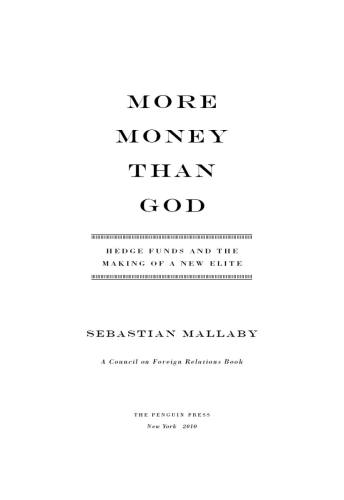
More Money Than God
Hedge Funds and the Making of a New Elite
کتاب های مرتبط
- اطلاعات
- نقد و بررسی
- دیدگاه کاربران
نقد و بررسی

March 8, 2010
Journalist Mallaby (The World's Banker
) gives unusually lucid explanations of hedge funds and their balancing of long and short positions with complex derivatives, but what really entrances him is their freedom from regulation, high leverage, and outsized performance incentives. In his telling, they empower a heroic breed of fund managers whose inspired stock picking, currency trading, and futures contracting outsmart the efficient market. In engrossing accounts of epic trades like George Soros's 1993 shorting of the pound sterling and John Paulson's shorting of subprime mortgages, the author celebrates hedge titans' charisma, contrarianism, and market insights. Mallaby contends that hedge funds benefit the economy by correcting market anomalies; because they put managers' money on the line and are small enough to fail, they are more prudent and less disruptive than heavily regulated banks. Mallaby's enthusiasm for an old-school capitalism of unfettered risk taking isn't always persuasive, but he does offer a penetrating look into a shadowy corner of high finance.

March 15, 2010
A history of hedge funds that also looks at their role in the recent market crash.
Using his extensive background in international finance, Washington Post columnist and Council on Foreign Relations senior fellow Mallaby (The World's Banker: A Story of Failed States, Financial Crises, and the Wealth and Poverty of Nations, 2004, etc.) effectively combines an insider's knowledge with a colorful storytelling ability. What we now know as hedge funds began in the late 1940s as a"hedged fund" invented by a low-profile investor named Alfred Winslow Jones. By then nearing 50, Jones had traveled the world before becoming a Fortune magazine writer. In clear, accessible language, Mallaby explains how Jones devised a specific combination of buying and selling stocks simultaneously, which allowed him to capitalize on bull and bear markets alike—i.e., he hedged against market downturns while riding higher on market upturns than most other money managers. After relating the Jones saga, the author provides a mostly chronological account of later investors who earned billions from variations on the Jones model. Mallaby avoids the sex-drugs-and-rock-'n'-roll aspects of the fast pace and fabulous wealth within the hedge-fund realm to concentrate on the buy-and-sell philosophies promulgated by the"boys." And it is indeed a boys' world—in more than 400 pages of text, no significant female players emerge. In the final third of the book, Mallaby explores the role of hedge funds in the horrific collapse of markets during the first decade of the 21st century. The author explains why he believes hedge funds are less of a risk to the markets than banks and insurers that grew too big to fail. One caveat: Hedge-fund managers usually invest lots of their own money, which means they lose wealth when clients lose wealth.
A lively, provocative examination of a little-understood financial realm.
(COPYRIGHT (2010) KIRKUS REVIEWS/NIELSEN BUSINESS MEDIA, INC. ALL RIGHTS RESERVED.)

June 1, 2010
Shrouded in secrecy, mystery, exclusivity and privilege, hedge funds have always remained the domain of the rich and well connected. Whether derided for destabilizing the market through excessive leverage or applauded for providing much-needed liquidity, private hedged funds have been around since the late 1940s and remain unregulated to this day. Mallaby, who spent 13 years at the Economist magazine and authored two previous books, presents a thorough history of hedge funds, beginning with the founding father of the industry, Alfred Winslow Jones, and continuing with men such as George Soros and many other less-well-known but equally influential players in this arena. The significance and role of hedge funds to the 1987 stock-market crash, the dot-com bubble, and the mortgage-securities bust are covered, and Mallaby presents this much-maligned industry in a more positive light than the typical media reporting on the subject, concluding that despite some dirty playing in the field, these high rollers provide better value to their clients than much of the commercial financial industry.(Reprinted with permission of Booklist, copyright 2010, American Library Association.)

























دیدگاه کاربران